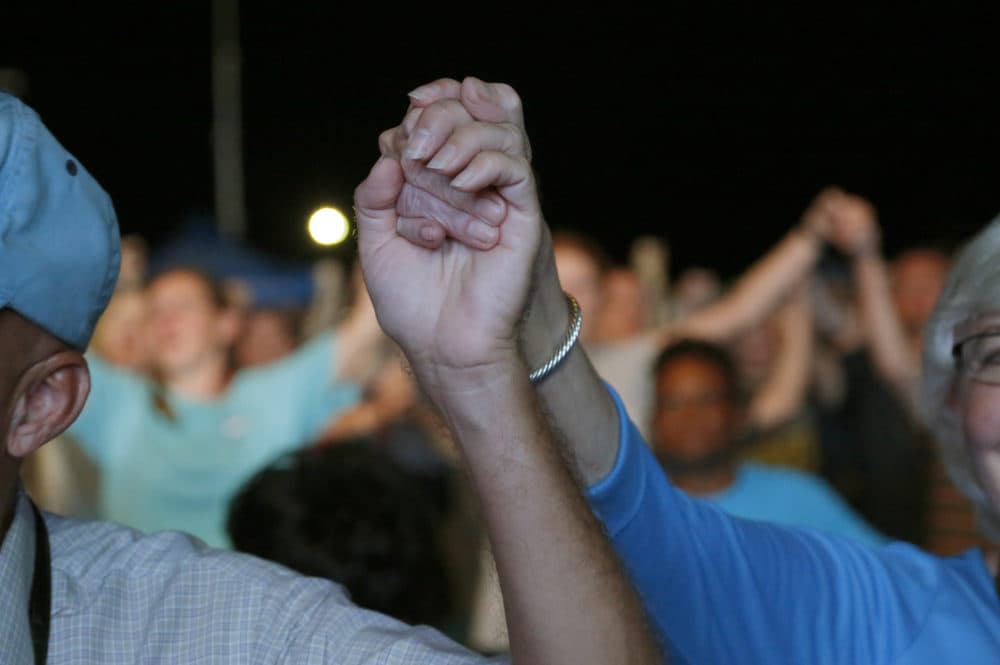Advertisement
First Person:
First Person: A pastor reflects on how politics divide his congregation
Resume
Hear our hour on the causes and consequences of evangelical fear here.
Scott Dudley is the lead pastor at Bellevue Presbyterian Church in Bellevue, Washington. It's just outside of Seattle, but would he call his church an evangelical church?
PASTOR DUDLEY: That word evangelical has evolved and changed. We would be what evangelical used to be. Which is high-view of the authority of scripture, a belief in a personal relationship with Jesus that makes life, and should make our world better. So that's what it used to mean. Now it means a lot of different things to a lot of different people, so I'm not sure what we would call ourselves.
MEGHNA CHAKRABARTI: We spoke with Pastor Dudley in an hour where we explored the fears of white evangelical protestants, and what those fears might culminate in. Pastor Dudley says many pastors that he knows are leaving their churches, and some are even leaving the ministry altogether.
And Dudley says he has a generally supportive congregation, but he too has faced what he calls a hostile work environment, recently receiving messages from congregants such as:
"I don't even know how you look at yourself in the mirror. You are so profoundly evil."
CHAKRABARTI: And why? Well, Pastor Dudley says it's partially due to his church's stricter COVID restrictions. But he also says the bigger issue is his church's focus on race. Below, Dudley explains more:
It's not just the vitriolic, I mean, incandescent-with-rage emails and comments. It's also people, and this is where it's particularly painful. People you have known for years. You held their hand in the hospital when their child died. You were in the room when they were getting chemo. And you've journeyed together for years and you say one thing in a sermon and they leave. That is a painful heartbreak.
Being a pastor isn't just a job, it's your whole life and it's your hearts. And, you know, in other professions, they may say you can't get too involved because you've got to guard your emotions. As a pastor, you've got to get too involved. That's the job. And you give your heart to people. And you get out of bed at 3:00 in the morning to go to the hospital and you bring God's peace to them.
But you say one thing they didn't like politically, and it may not even have been overtly political comment. It was just, Wow, you talk about that ... And they're gone. That's heartbreaking.
We've been working on racial justice for about six years. Because for me, it came out of a conviction that almost every book in the New Testament talks about some form of racial justice and reconciliation. Every time in the New Testament, they talk about Jews and gentiles, or Samaritans and Jews. Those are ethnic racial conflicts. And I think what people perceive and we've been really clear, we called it third way racial justice and reconciliation.
And we said, if we do this right, we will confuse and irritate both the left and the right because it will just look different. It will look like Jesus. Jesus is neither left or right. He's both and neither. But somehow, even when you talk about it, the perception is that you are leftist, and you're pushing a leftist agenda.
Now, I should say, there are also plenty of people in my church who are grateful that we're doing this. And then there are people in my church who feel like — and this is where it comes from the left, we've been way too timid. And why aren't you blasting people for their white privilege every Sunday? And you're going way too far, you're not going nearly far enough.
My eyes have been opened to say, Oh my gosh, again on both sides, left and right. Your politics is more important to you than anything the Bible might say. And when you hear something that you don't like politically, your first instinct is to argue about it, or just leave. Rather than going to prayer and going to the Bible and saying, Is this true? It's profoundly disillusioning. It's like, Oh my gosh, we have failed across the board in this country to help people in our congregations understand what it means to be Christian. It is the American church. It's a big, fat 'F' on discipleship.
In this diary ... we hear from:
Pastor Scott Dudley, lead pastor at Bellevue Presbyterian Church in Bellevue, Washington.
This segment aired on November 19, 2021.
